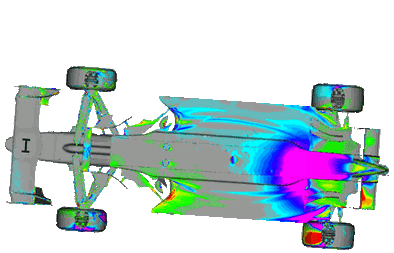Quote:
Originally Posted by freebeard

At small angles: Morelli's Banana car. At high angles: NASCAR rooftop fences to spoil lift when driving sideways.
|
I did find a CFD animation of an f1 car changing angles (for a turn) that's pretty cool. You can see pressure zones walking around and changing magnitude

Quote:
Originally Posted by freebeard

Consider the Aerocivic; it goes to great pains to contain and segregate wheelwell turbulence and underbody airflow.
|
I understand keeping them separate, but I was surprised the center had the slowest and highest pressure of the floorpan. The openings for exhaust probably hamstrung their efforts a little. But it makes sense do try and raise pressure at the wake
Quote:
Originally Posted by freebeard

Once again, I don't get strakes, but I compare to the driprail on the roof of my Superbeetle. I think the strake at 45° angle will (like a Gurney flap) roll the air toward the center of the car, not deflect it outward.
|
I saw an interesting picture earlier that I'll post when I get home, but it should work like fin style vortex generators while guiding some airflow as well
Quote:
Originally Posted by freebeard

If it operates as you describe, the rearmost strake ends way early.
|
I think they're juggling moving away from center, and having several vortices that drive airflow across the full width of the pan. Strakes further rear end further inboard so they have vortices in more than one place along the pan. A vortex can provide more force than laminar flow, at the expense of drag. The fins on rear diffusers are vortex generators. For anyone interested here's a great presentation I found on it from an F1 engineer. Its pretty cool stuff. This guy knows a lot and isn't afraid to share it
https://www.linkedin.com/pulse/how-d...rk-willem-toet